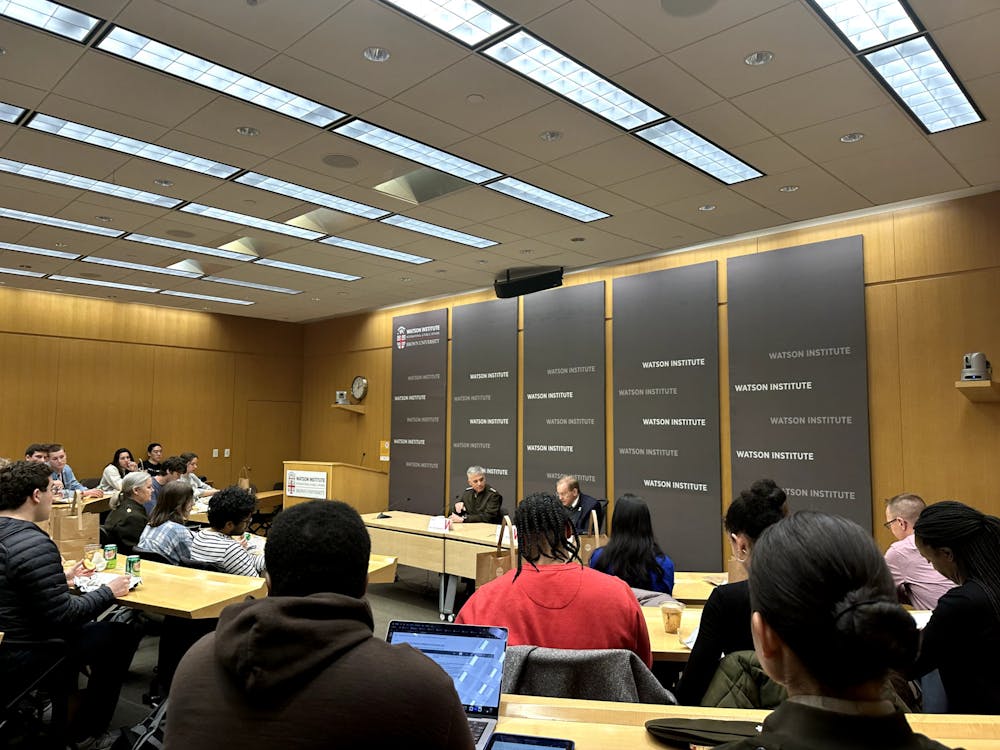Gen. Paul Nakasone, commander of the U.S. Cyber Command and director of the National Security Agency, discussed American cybersecurity and his experience during a Watson Institute of International and Public Affairs event on Wednesday.
In conversation with James Langevin, former U.S. representative for Rhode Island and current senior fellow at the Watson Institute, Nakasone spoke at an event titled “U.S. Cyber Command: ‘Defending Forward.”
NSA Cybersecurity seeks to prevent “threats to U.S. national security systems with a focus on the Defense Industrial Base and the improvement of our weapons’ security,” according to their website. The U.S. Cyber Command’s website describes itself as the country’s “first line of defense in cyberspace.”
Nakasone was appointed to his current position in May 2018 after serving as the commander of the U.S. Army Cyber Command. Soon after his appointment, the 2018 midterm elections took place, elections in which security was a major priority after claims of interference in the 2016 presidential election.
“We were going to have a safe and secure midterm election, or they were going to have a new director and a new commander of U.S. Cyber Command,” Nakasone said.
Langevin highlighted the importance of election security given the incentives of foreign adversaries, who have “a real interest in trying to interfere with our elections and also instill divisions.”Nakasone’s election security concerns have evolved since 2018, when he was “worried about trolls and Twitter,” he said: In 2020 and 2022, his office began focusing on potential threats from China, Russia and non-state actors.
To protect against potential interference, Nakasone stressed the importance of having a “series of partners that have different authorities and different capabilities” in cybersecurity.
Cybersecurity has also been a major focus in the ongoing war between Russia and Ukraine. On Dec. 3, 2021, U.S. Cyber Command sent a hunt-forward operation into Kyiv — in which the U.S. deploys a small team “forward at the request of a foreign government to hunt down the requested networks of that government.”
This partnership allows the U.S. Cyber Command to see “what our adversaries are doing — their tradecraft, their malware and their techniques” and then allows for that information to be shared worldwide. The technique “provides a level of security and a level of frustration to our adversaries,” Nakasone explained.
In Kyiv, the on-the-ground operation garnered more information on ongoing cyber attacks, giving Ukraine the ability to “withstand a number of different attacks that the Russians” conducted. “They were to understand what was going on,” he added.
Given the international security stakes of his role, Nakasone described his field as one in which “the fast eat the slow.” He added that his dual appointment as director of the NSA and commander of the U.S. Cyber Command reflects the dynamic nature of cybersecurity.
“If you want to operate in cyberspace, you have to do three things: You have to have speed, you have to be agile and you have to have unity,” he said.
Bringing the NSA and the U.S. Cyber Command under one leader solves problems that emerge “when you have two different leaders because you have to agree on things, and you want to (act quickly) in cyberspace,” Nakasone said.
Nakasone also touched on a shift in the culture of the NSA and U.S. Cyber Command, which is seeking to provide greater transparency in facilitating new ideas.
“If we can share the information — as long as our sources and methods continue to be viable — why are we not?” he said.
Carson Bauer ’26, who attended the event, said he was especially struck by Nakasone’s “high position.”
Nakasone setting aside “the time to come here and talk to us about his experience and how the NSA is tackling foreign and domestic cybersecurity challenges (was) really exciting,” he said.
Correction: A previous version of this story misstated that the NSA and U.S. Cyber Command sent a hunt-forward operation into Kyiv, when it was only the U.S. Cyber Command. The Herald regrets the error.
Clarification: Gen. Paul Nakasone's position as commander of the U.S. Cyber Command was added to the headline of this piece for clarity.

Ryan Doherty was the managing editor of digital content and vice president of The Herald's 135th editorial board. He is a junior from Carmel, NY who is concentrating in chemistry and economics. He previously served as a university news and science & research editor, covering faculty and higher education.





